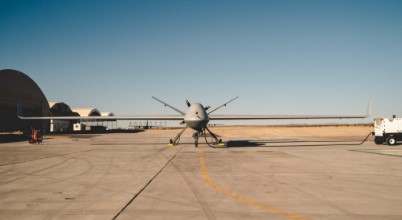On May 14, 2025, a major event took place in Doha, the capital city of Qatar. The United States and Qatar signed economic agreements worth more than $243.5 billion.
Massive Economic Package Between Two Nations
These deals are part of a larger plan that could bring the total value of their economic relationship to $1.2 trillion. This large number shows how serious both countries are about working closely together, especially in defense, aviation, and technology sectors—including the sale of advanced MQ-9B Reaper drones designed for surveillance and precision missions.
Two of the most important parts of this package are defense deals worth nearly $3 billion. One of them is a $2 billion agreement involving the sale of advanced drones called MQ-9B Reapers. The second is a $1 billion deal for a system that helps defend against enemy drones. These agreements were signed between the governments of both countries and approved by the U.S. State Department earlier this year.
The goal of these deals is to help Qatar modernize its military while also strengthening its security partnership with the United States. These deals are expected to support jobs in American factories and defense companies.
Advanced Drones Designed for Safety and Strength
The $2 billion agreement includes the sale of the MQ-9B SkyGuardian drone system. These drones are made by General Atomics, a company based in the U.S. The MQ-9B is a type of drone called MALE, which stands for Medium-Altitude Long-Endurance. This means it can fly high and stay in the air for long periods—more than 40 hours at a time. It can also travel very far, over 11,000 kilometers, and fly above 12,000 meters.
This drone is not just for flying. It is designed to carry out many important missions like surveillance, reconnaissance, and targeted attacks. It uses satellite communication to operate over long distances, even beyond the line of sight of the person controlling it. The MQ-9B can fly in any weather and is built to operate safely even in civil airspace. It can also take off and land automatically without a pilot.
The MQ-9B drone is strong and built to last, with a life span of about 40,000 flight hours. It meets international safety standards and is designed with extra care to handle damage. The MQ-9B carries many types of equipment, including bombs, missiles, and electronic systems. It has nine spots on its body to hold weapons or sensors and can carry more than 2,000 kilograms of gear.
The drone’s camera system includes radar and electro-optical/infrared sensors that work day and night. This helps it gather information in real-time. It can also detect other aircraft in the sky using a special system that helps avoid collisions. The MQ-9B is useful in many situations like coastal surveillance, underwater threat detection, and supporting ground forces during military operations.
Qatar will receive eight of these MQ-9B drones, along with hundreds of guided bombs and missiles, radar systems, communication tools, and full maintenance support.
Counter-Drone System to Tackle Modern Threats
The second big defense deal is worth $1 billion and involves a system made by Raytheon to fight enemy drones. This system is called FS-LIDS, which stands for Fixed Site – Low, Slow, Small Unmanned Aerial System Integrated Defeat System. It is designed to detect, track, and destroy small enemy drones that fly close to the ground, including those that may attempt to evade high-end surveillance platforms like the MQ-9B.
Qatar is the first country outside the U.S. to get this system. It will receive about ten full units and one hundred drone interceptors. These systems use radar, electronic jamming, and other tools to stop enemy drones. This complements Qatar’s purchase of MQ-9B drones by adding a layered defense approach to detect and respond to various airborne threats.
The FS-LIDS system includes multiple parts: sensors that can find drones, interceptors that can knock them out of the sky, and electronic systems that can jam their signals. Together with the MQ-9B’s long-range detection and reconnaissance abilities, FS-LIDS strengthens the protection of key locations like military bases or important buildings.
This purchase was approved by U.S. officials as early as November 2022. Just like the drone deal, this one also supports American manufacturing and defense jobs. It also helps both countries build a stronger defense relationship.
In total, these defense deals are part of a bigger plan involving over $38 billion in military cooperation. This includes continued upgrades for the Al Udeid Air Base in Qatar and future defense equipment in air and sea sectors.
Alongside defense, Qatar also signed a large $96 billion deal for aircraft made by Boeing and engines from GE. This aircraft purchase from Qatar Airways is expected to support around 154,000 jobs every year in the U.S. during its production phase.
Qatar has also made strong investments in the U.S. energy sector—more than $18 billion since 2019. These steps help keep the energy system in the U.S. more stable and strong. In terms of military sales alone, Qatar ranks as the 12th largest U.S. partner, with active deals worth over $26 billion.
These agreements between the United States and Qatar show a deepening relationship in economic and defense areas, bringing mutual benefits to both nations.

